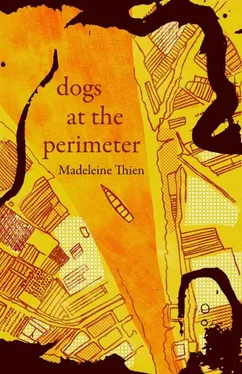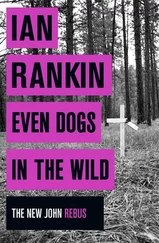When I told her I didn’t know she said, “He went away with that boy. They went away and then the boy came back alone.”
Gently, I rubbed the paste onto her skin and as I did so, tears began to run from her eyes. I could not bear it. I blew the candle out.
The night passed slowly. The infirmary was never still. People called to ghosts who were not there, living ones or lost ones, names that no one answered to. The words filled the space like an incantation. Unable to sleep, I got up and went outside. First light came, I thought of Bopha waiting for me, and the mud of the reservoir seemed to grow brighter in my imagination, all the black-clothed workers, war slaves, the cadres sometimes called us, though the war had ended long ago. Here, in the infirmary, there were mothers and fathers and children, but hardly any who belonged to each other. Infrequently, the nurses came through. They were hardened now, more unforgiving than they had been before. I saw a woman being sent back to her work unit. Stone-faced, unable to weep, she left a bundle of food beside her son. Rice, fruit. By evening, the food had disappeared but the boy had not moved. I had hideous, nightmare dreams about my brother. On the third morning that I was there, I saw the nurses lift the boy’s body and carry it away. All day, my mother did not open her eyes.
I scavenged, going farther and farther afield because the land near to the infirmary had been picked clean. In my mother’s pocket, I had found her travel pass and I carried it everywhere with me. The pass was signed not by Kosal, but by a name I didn’t recognize. I searched desperately for frogs, lizards, crickets, but my movements and my thoughts were slow. I, too, was starving. I returned with herbs and wild grasses and made a thin soup for us both. “The food is ready,” my mother said. “Call your brother to the table. Give him a little rice.” All too clearly, I could see the images in her mind, our white kitchen, her silvery pots, her family. I lay beside her and tried to disappear into my mother’s world, to become her, to keep her near and lose myself instead. I begged her to be strong, to come back. I could not bear to survive alone.
On the third day, the boy, the doctor, came and told me that I had to leave. I asked who would take care of my mother and he said that he would. “Who will bring her food?” I asked. He said that Angkar would provide. I said that I would not leave, and he looked at me, surprised. He asked my name and my work unit. When I didn’t answer, he asked to see my travel pass. I showed him the one I had taken from my mother. He stared at it for a long time, and then he flung it back. He could not read, I realized. The child doctors of the Khmer Rouge could not even read. He told me to leave immediately, that she was no longer my responsibility. I knelt on the ground, weeping, trying to wipe the dirt from the scrap of paper.
My mother’s chest rose and fell, struggling on and on. A nurse came and told me, urgently, that I must leave, all the relatives had to go, the doctor had sent word to Angkar. And then what? I wanted to ask her. What more could Angkar do to us? But the nurse had already hurried off. The world had grown too large for me, it was asking too much, too much. I held my mother’s hand, I kissed her fingers. “The rice,” she said. “Please, my darling. Bring me a little rice.” The things I had scavenged lay around us. Fruit, herbs, water. I searched my mind for what I should do, where I could find food, how I could help her, but my thoughts felt like grains of sand, scratching, tumbling. My father’s stories came back to me, all the heroes that persisted in Khmer poems and myths, so many stories that promised us we were braver than we were. I wanted to shake him, I wanted to tell him that the things we try so hard to keep, the beloved, most precious things, keep slipping through. We had always been powerless to keep them safe. I got to my feet, I went outside for air, and then I kept walking, kept going. At the junction where Bopha had parted from me, I stood, weeping, trying to will myself to return. Go back, I told myself. She needs you. She’ll die without you.
I kept going, as if we were again leaving the city, this exodus that had begun and had never ended. I walked and saw the crowd beside me. People had carried the things they treasured, a machinist carried his tools, a grocer pushed a cart of groceries, my father carried books. In my mother’s bag were photo albums, our clothes, our toys. Later on, all these things had been abandoned, bit by bit, on the side of the road. A space grew around me, it rose from the soil, a space in which there were no doors, no light or darkness, no landmarks. No future, no past. The things I had kept hidden from Angkar had not been buried deep enough. From far away, I saw myself as I had been many years ago, carried by my father. He swung me down and laid me in my mother’s arms. I carried this image with me as I walked away, pushing it down, clothing it in darkness. Turning so completely away from it, the image slowly disappeared.
When I reached the reservoir, it was dawn. Bopha was awake, waiting for me. My thoughts, my memories, my body, were separating but she held me tightly, she tried to keep me from coming apart. She told me to go to Vuthy right away, to tell him I had been sick and I had gone into the forest to find medicine. That I had been feverish and had gotten lost but, this morning, I had found my way free again. I did everything just as she told me. In his hut, Vuthy watched me intently. When I had finished explaining, he told me to sit down. He gave me a plate of food with rice and fish, and when I was done eating he told me not to tell anyone about the food, to go back to my work unit, and to continue on.
The hot season ended. I lived and worked and dreamed beside Bopha. At night, while I listened, she spun stories for me. She told me about a boy named Chantou who had run away into the forest. “He lived up in the trees,” Bopha said, “safe from the wild animals.” She said that, in the north, the Tonle Sap floods everything, the lake rises so high it covers not only the buildings but the highest branches of the forest. In the trees, the boy Chantou had gathered up the dead bodies of sodden birds. He had found fish in the branches, stranded there when the water subsided.
“Fish in the trees,” I said.
Bopha looked up at the starlight. “More and more the farther he climbed.”
We imagined the boy Chantou. He lay beside us, telling his stories. Our own lives were littered with traps, unanswerable questions, and it was Bopha who first taught me how to escape from myself in this way, disappearing into the souls of other people, both the real and the imaginary.
Early mornings, in the forest beyond the reservoir, we tried to find food. We stripped bark from the trees, and then we put these curling strips into the puddles of water that had gathered in the indentations of rocks, and we drank the liquid up. Small birds came and hung upside down, warming themselves in the patches of light. When I stretched out my hands to capture them, they blurred away. We ate leaves, husks, stems, and wild grasses, but our stomachs couldn’t digest them and it took too much energy to grind the food into pulp. I imagined climbing up into the highest branches and glimpsing the airplanes that had once paraded across the sky. Thida disappeared, then Chan, then Srei. Other children arrived to replace them. Su, Leakhena, Dara, every one of us like water spilling into the ground. My body was wearing out. I was so thirsty I wanted to pour the blue sky into the palm of my hands, swallow it in great gulps. One night, I remember, Bopha killed a snake and we charred it on the fire. The meat was leathery, rich, and tough. Bopha’s face, her enormous eyes, lit up with pleasure.
Читать дальше












